
Topics
In Haiti, police opened fire on thousands of demonstrators who marched through the Bel-Air neighborhood of Port-au-Prince Monday to mark the anniversary of the coup that ousted President Jean-Bertrand Aristide and call for his return. We go to Haiti to speak with attorney Bill Quigley who attended the march. [includes rush transcript]
As we continue our coverage of the anniversary of the coup in Haiti, which was carried out one year ago this week. In a moment, we will go to Port-au-Prince where police opened fire on a group of peaceful demonstrators who were calling for the return of President Aristide. But first, we turn to President Aristide himself. For months, he has been living in exile in South Africa and has maintained a very low profile. But a few days before the anniversary of the coup, Aristide granted a rare interview to the famed Afro-French journalist Claud Ribbe.
- “Aristide, 1 Year Later”–excerpt of documentary by French journalist Claude Ribbe.
Aristide says, “I am the President of Haiti, even if I am not in Haiti. I finish my term. I want to return to my country before time goes by on the basis of a negotiated agreement or a dialogue so that free, honest and democratic elections could be held, as stated by the Constitution.”
Arisitide also names two high level French emissaries who he says threatened him in the days before his ouster to either resign or be killed. He identifies them as Veronique de Villepin–the sister of French Foreign Minister Dominique de Villepin and the French Foreign Minister’s appointee, Regis Debray.
Aristide maintains he was overthrown what he called a “modern-day kidnapping” in the service of a coup d’etat backed by the United States.
Meanwhile, in Haiti, police opened fire on thousands of demonstrators who marched through the Bel-Air neighborhood of Port-au-Prince Monday to mark the anniversary of the coup.
Chanting “Aristide for life,” the thousands of protesters marched peacefully to demand Aristide’s return. As the demonstrators rounded a corner at a Bel-Air intersection, police opened fire killing as many as three people. In response, Democratic Congressmember Maxine Waters of California sent a letter to Secretary of State Condoleezza Rice that expressing “shock and outrage” and urging and investigation into the incident.
- Bill Quigley, a volunteer attorney in Haiti with the Institute for Justice and Democracy in Haiti. He was at the march yesterday in Port-au-Prince yesterday when police opened fire.
Transcript
AMY GOODMAN: We go now to Port-au-Prince to speak with Bill Quigley. He’s there as a voluntary attorney with the Institute of Justice and Democracy in Haiti. He was at the march yesterday when police opened fire. Bill Quigley, welcome to Democracy Now!
BILL QUIGLEY: Thank you, Amy.
AMY GOODMAN: It’s good to have you with us. What happened?
BILL QUIGLEY: We had been marching with people through the neighborhood, and it was a really joyous occasion, people singing and dancing and jumping and shouting and holding up homemade signs and chanting, “Bring back Aristide.” And there was a lot of international media there. There were U.N. troops that were every couple of blocks, and it looked like it was going to be a very peaceful demonstration and very safe. And then all of a sudden, about 30 minutes into the demonstration, as thousands of people were coming down this street, there was just a series of booms from the police and people scattered and screamed. There were people down in the street. They showed pictures on the television last night of somebody who had the back half of their head blown off. There was other people who were beaten by the police, but it was just shot after shot after shot, and these booms just echoed through the streets as children were screaming and crying and people diving for cover and running away, and it wasn’t actually 'til a lot of the U.N. troops came in that people felt even safe enough to be able to venture back to the street to be able to try to escape the neighborhood. It was a horrifying and totally unprovoked massacre. People didn't have — they had no guns, no bats, no pipes, no rocks, no anything. They were holding up political signs and dancing. There was a band. It was just a shocking display of an attempt to repress human rights and democracy.
AMY GOODMAN: Bill Quigley, what about the U.N., as they call them, the blue helmets? What were they doing?
BILL QUIGLEY: Well, they, really, before all this started, they were just in the neighborhoods strategically placed, and people basically ignored them, and the people felt that they were there, you know, to ride herd on the demonstrators, but there were still many people, and it was such a joyous thing. The people danced around the tanks and waved the pictures to the blue-helmeted folks and their machine guns and that, but it turned out that they are actually the ones who came in to minister to the people who were shot, and they were the ones that turned the neighborhood back safe enough from the police. The police, there was a report of like a police tank-like truck running down the street. There were the state police who were dressed all in black and SWAT teams, helmets, ski masks, heavy guns, combat boots, and the like, kicking people, shooting people and the like, and it was just totally unprovoked. And as — I was there with Father Gerard Jean-Juste, who your listeners know well, and he said on the way back, he said, “You see, Bill, you know, what we face trying to do a nonviolent return of democracy in Haiti.” And he said, “The challenges we face are just incredible. We need international support to help us bring back our president, release our political prisoners, and restore constitutional democracy in Haiti.” It was a horrifying illustration of the abuses that are going on there right now with the — going on here right now back with the government that certainly was selected by the United States.
AMY GOODMAN: Bill, who was the journalist who was shot?
BILL QUIGLEY: I am not sure who that person is, to tell you the truth.
AMY GOODMAN: Well, Bill Quigley, I want to thank — go ahead.
BILL QUIGLEY: I was going to say, there were people down in the street, and they were dragging people away. It was mass, mass confusion.
AMY GOODMAN: Well, I want to thank you very much for being with us. Bill Quigley, joining us from the streets of Port-au-Prince, talking about the latest news out of Haiti: Police opening fire on pro-Aristide demonstrators. If you want to go to our website at democracynow.org, you’ll see our comprehensive coverage of Haiti, the first going through this year, particularly on the days immediately following the coup.

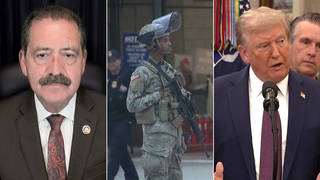
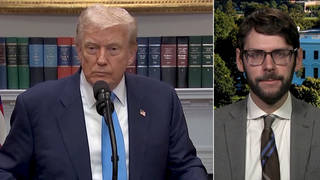
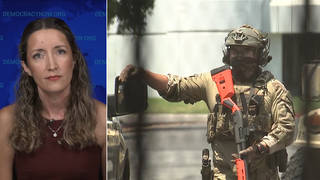
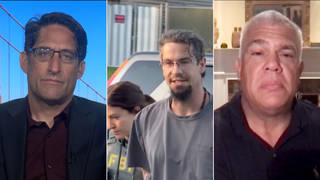





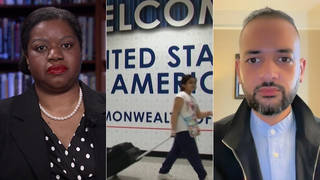
Media Options